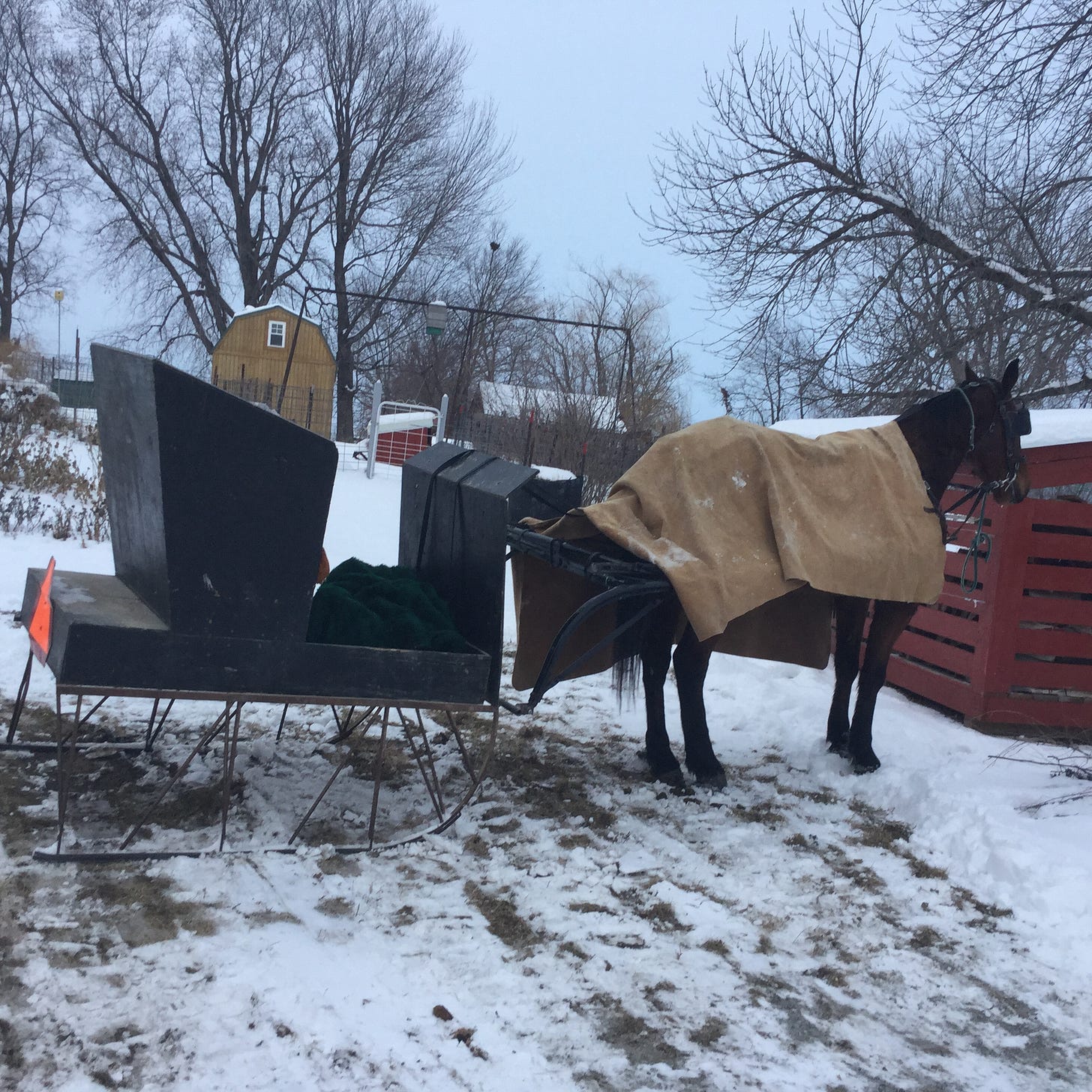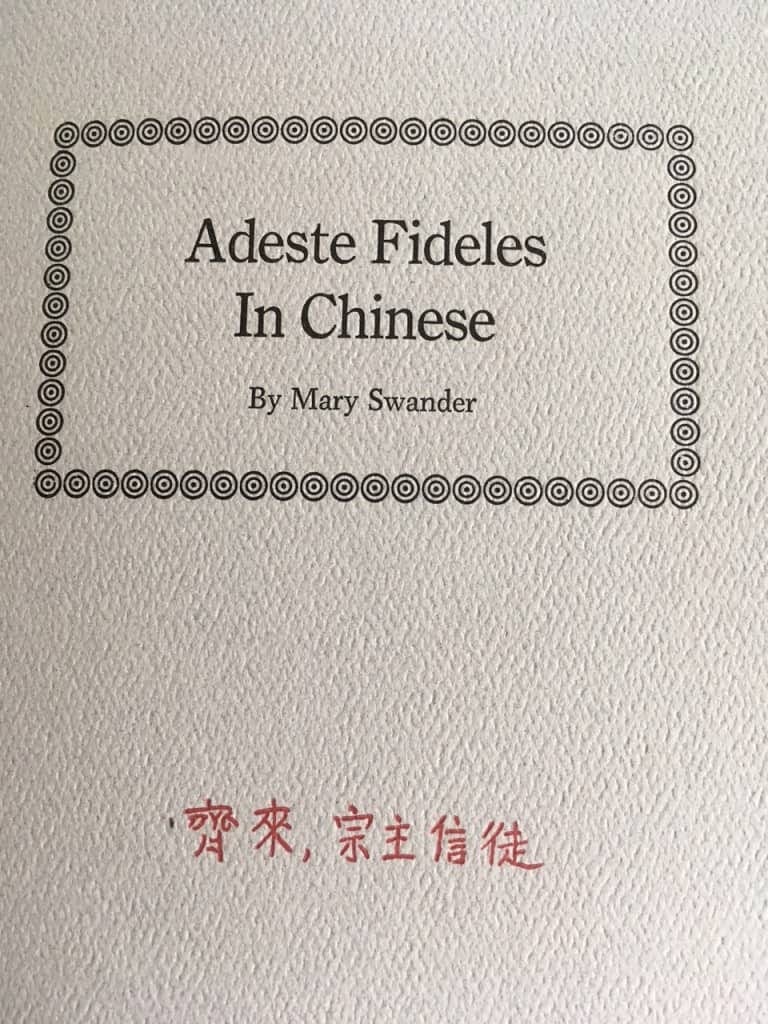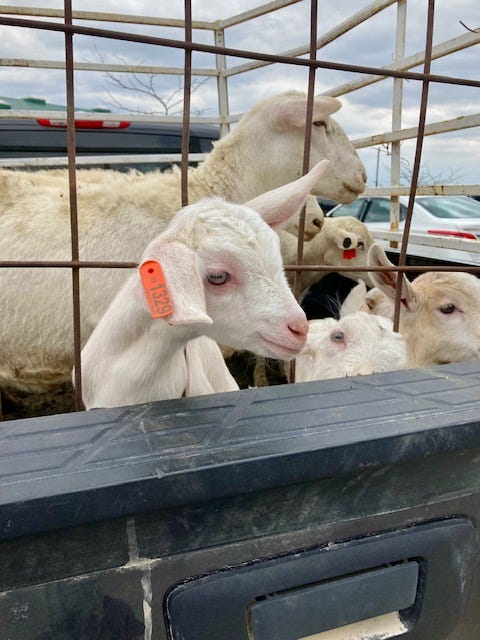Listen to Mary Swander read her Christmas story.
They came in threes—like the Magi—two buggies and a sleigh filled with three generations of Amish to sing carols at my neighbor Donna’s door. Abram and Bertha shepherded their grown children and their children’s children into Donna’s small den. Just a few months before the holidays, Donna’s youngest daughter had suddenly died of a stroke at age 49. The two had been close, talking on the phone every day, taking vacations together, and sharing the care of the grandchildren. So the Amish had planned this caroling visit as an attempt to ease Donna’s grief.
Abram stood in the rear of the group, his long red beard streaked with white, Bertha at his side with a black shawl pulled tightly around her shoulders. The unmarried children came next. Tall and lean, three young adult women’s heads bobbed inches over their parents, their slender faces framed in their black bonnets. The grandchildren—two to four years old—stood in the front, eyes wide, taking in the English language conversation, a language they do not hear at home.
The family gave Donna a plate of homemade cookies, and knowing that I couldn’t eat sugar, gave me a bag of bird seed.
“Thanks so much,” I said. “This is great, but not quite as great as the year you gave me a skinned rabbit!”
“Hark! The herald angels sing,” the family began in harmony. Abram and one of his sons took the bass, a couple of the son-in-laws the tenor. Sharp sopranos, the women’s voices rose and danced near the ceiling. “Glory to the newborn king.” The grandchildren stretched out their hands to pet Donna’s cat who tiptoed through the room, his tail filtering through their fingers.
Four or five more carols followed. The grandchildren fidgeted, their fathers placing their hands on their children’s shoulders and pulling them close to their pant legs to keep them quiet. I passed around some candies and the grandchildren’s hands were quickly smears of dark brown chocolate. One of the unmarried daughters wiped their fingers on the underside of her skirt. One of the young boys climbed up into Donna’s rocking chair and leaned his body weight into it, swaying back and forth with ferocity to the strains of “Go Tell It on the Mountain.”
“Silent Night” concluded this mini-concert, sung first in English, and then in German. “Stille nacht, heilige nacht.”
“Mary and I can sing “O Come All Ye Faithful” to you in Latin,” Donna said. Although we hadn’t known each other at the time, Donna and I had gone to the same Catholic church as children, and had ended up with a similar repertoire of hymns and carols. “Adeste fideles,” Donna sang, “ laeti triumphantes. . .”
“Venite, venite in Bethlehem!” I joined in.
Our voices quieted, then rose higher and higher with every repetition. “Venite adoramus, venite adoramus, venite adoramus, Domium!”
The Amish stood mesmerized, smiling, the little boy in the rocking chair stilled.
“So that was Latin?” one of the older daughters asked.
“See, we can sing carols in two languages, too! I said, and everyone laughed. This small cultural exchange not only bridged continents, but centuries of religious prejudice.
Soon, the family had gathered themselves together, the children pulling on their mittens. Outside, the horses snorted in anticipation of trotting down the road again.
On the way out the door, one of the older daughters whispered to Donna, “Can you teach us the Latin? We’ll be over tomorrow night. But don’t tell Mom and Dad.”
My neighbor Donna’s living room filled with Amish teen-agers and young adults, taking their places on the sofa, the rocking chair, and the piano bench. Siblings and cousins, they had arrived to learn Adeste Fideles and wanted to sing it for their parents and grandparents as a surprise at their upcoming Christmas celebration.
“Each year after Christmas dinner the young people are asked to perform a little skit,” Martha explained.
I ran home, Googled the hymn, printed off all eight verses, made copies, and hurried back. My hope was to teach the young people maybe two verses, thinking that that might even be a struggle.
The Amish pulled Donna’s draperies, in fear that their parents might drive by on the road and see them inside her house. Never mind that the young people had hitched their horses and buggies to the post in Donna’s yard.
Surely their parents would notice the young people missing from the household and I wondered what they had told them upon their departure.
“I told them I was going hymn singing,” Mel said.
“Okay, then. Let’s just read the lyrics first,” Donna said. “Then we’ll sing them.” Slowly and deliberately, she began, “A-des-te Fi-de-les.”
“Adeste Fideles,” the Amish mimicked back at normal speed.
“Lae-ti tri-um-phant-es” Donna continued.
“Laeti trimumphantes.
Quickly, we were moving into the the chorus.
“Venite adoramus,” Donna picked up the speed.
“Venite adoramess,” the Amish replied, pronouncing the second word with a particular flatness.
“Adora-mus.” Donna corrected.
“Moose. Adora-moose.”
The first verse and chorus down, the Amish galloped through all eight verses, then sang the entire hymn, never missing a word, beginning to end, with clear, adolescent voices, the living room ringing with harmony and the sound of the prolonged Adora-moose echoing through the air.
“So that’s Latin,” Mel said at last and wondered what the hymn sounded like in German.
Across the lot line and through the fence I went again to boot up my computer and print off the lyrics in German. Upon my return, I ran into Donna’s son and daughter-in-law-- Jeff and Jenny--just arriving in their car.
“What’s going on here?” Jeff asked, pointing to all the buggies in the lane. I explained that we were teaching the Amish Adeste Fideles and Jeff just grinned and shrugged his shoulders. Jenny, a Chinese immigrant, looked a little more perplexed, but went along with the flow.
Nun freut euch, ihr Christen, singet Jubellieder
und kommet, o kommet nach Bethlehem.
The Amish young people, who speak Deitsch, a dialect of German without a written language, struggled a bit with the High German. Then they got their bearings and whizzed through all eight verses in that language.
Kommt, lasset uns anbeten;
Kommt, lasset uns anbeten;
Kommt, lasset uns anbeten den König, den Herrn.
“What other verses could we do?” Martha asked.
Jeff looked at Jenny, and simultaneously, we all had the same thought. Jeff whipped out his phone and Goggled the Chinese lyrics. He explained to Jenny that the tune was O Come All Ye Faithful.
Jenny took a big breath and began singing in Chinese, and like the Amish, she eventually rolled through all eight verses in her native language.
At the end of her concert, the Amish rushed to huddle around Jeff’s phone, leaning in to see the Chinese writing, thinking that the lyrics didn’t sound so difficult and that they might learn yet another version of the hymn.
“That’s Chinese?” Martha asked. “Oh, we could never read that! That’s nothing but a bunch of sticks!”
Christmas past, it was time for Donna and me to distribute our gifts to our neighbors. We usually return their holiday cheer on New Year’s Day, loading one of our cars with plates of cookies and candies, popcorn balls and puzzles for the children, dried pears from my tree, and other little miscellaneous items I may have collected throughout the year like the box of solar keychain flashlights I had once received from my brother who lives in Cambodia.
But this Christmas wasn’t full of cheer for Donna. The shock of her daughter’s death had left Donna in a deep state of mourning, a grief that couldn’t quite mobilize itself to get up and bake cookies.
“Let’s put this off for a few days,” Donna had said. “I’m not organized yet.”
Fine, I agreed, but went into gear preparing my goodie packages, knowing full well that I might be making the neighborhood rounds by myself this year. A couple of days passed, and Donna called again.
“I just don’t think I can go this year,” she said. “It’s too sad.”
No worries, I assured her I understood the problem. I got out my popcorn popper and started in on that part of the ritual, thinking about how difficult the holidays can be for someone at a time of loss, how the togetherness and forced joviality of the season can, in fact, be stressful for all of us.
At the end of the morning, I tied up my packages with red and green ribbon, made some small cards and attached them to the parcels. For many years I didn’t even bother to make cards, but Donna couldn’t comprehend how the neighbors who weren’t home would know who had left the package.
“Don’t worry,” I told her. “They’ll know that no one else is going to give them dried pears and solar flashlights from Cambodia.”
But this year with a little extra time on my hands, I decided to go all out and make handmade cards for each family on our list of fifteen households. Just when I was finishing the last card, the phone rang.
“I’ve decided to go,” Donna said. “Give me an hour.”
In just that amount of time, we had my car filled with gifts, and down and around the icy gravel roads we went, stopping in on one neighbor after another to say hello and wish them a Happy New Year, exchanging little bits of local news, and leaving packages in mailboxes and mud rooms for those celebrating away from home.
At the end of our rounds, we pulled into Abram and Bertha’s long circular drive, past the two hoop houses and the garden shed, and the barn where the goats would soon be kidding, stopping by the back door. I could sense that Donna was just about at the end of her endurance, that she was pushing herself to get through the afternoon and was longing to return home to curl up in her easy chair in front of the fire with her own thoughts. One of the nanny goats stuck her head out the barn door. Jack, the little mutt dog that someone had dumped in the ditch near their house with a bag of food, scurried out to greet us. He sniffed the packages with hopes that a few crumbs might drop his way.
We knocked on the door and received no reply. We knocked again.
“Maybe they aren’t home, either,” I said.
But just when we were about to push open the door ourselves to leave the gifts, it opened and the whole family stood there, Martha and her older siblings bursting into song:
Venite, adoremus!
Venite, adoremus!
I saw Donna’s face brighten and lift, a moment of respite in a long period of grief. No matter the language—English, German, Latin or Chinese—the hymn drove home the idea of the sacredness of a humble birth and the preciousness of all we cherish on earth and in the heavens above.
Venite, adoramus Dominum!
Venite, adoramus Dominum!
Copies of Adeste Fideles are available as a beautiful hand-made book printed by Tim Fay at Route 3 Press. A collector’s item. For a copy, please send $17 to:
Mary Swander, AgArts, P.O. Box 516, Kalona, IA 52247
or pay through the DONATE button on the AgArts website:
www.agarts.org
I am pleased to be a member of the Iowa Writers Collaborative. Follow our work in the IWC Sunday Round-Up.











Mary, this is one of my favorite of yours, such a beautiful story. Peace to your and all your neighbors.
A ray of light in this world. Thank you!